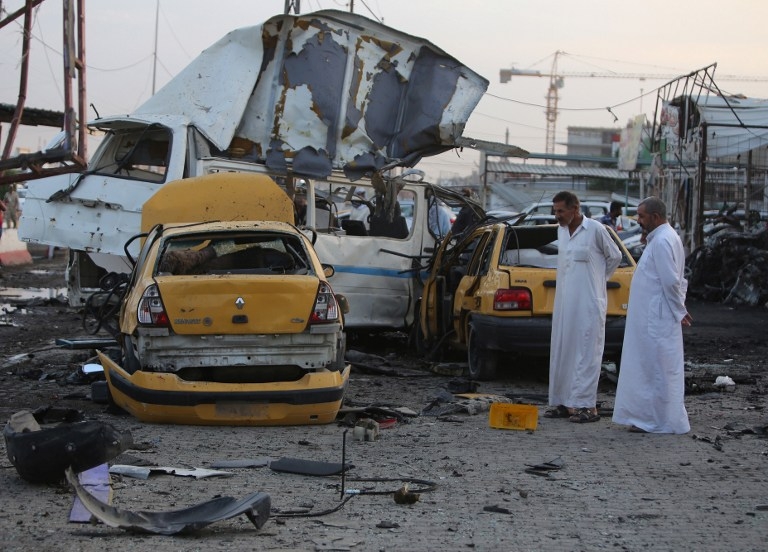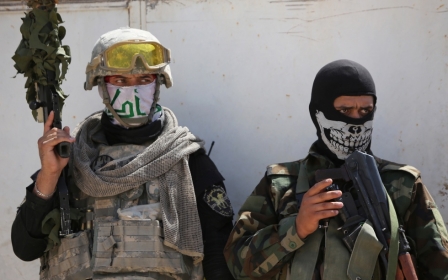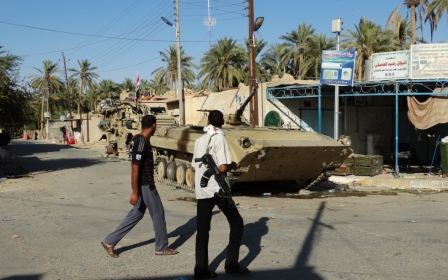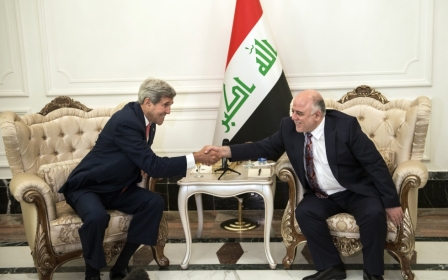Iraq MP and militia leader killed in bombing claimed by IS

An Iraqi MP and prominent militia leader was one of at least 21 people killed on Tuesday in a suicide bombing immediately claimed by the Islamic State (IS) group.
Ahmed al-Khafaji, a commander in the Shiite Badr militia, was killed in the attack in the Kadhimiyah area of Baghdad, a fellow lawmaker and a medical official said.
The bombing, which wounded at least another 51 people, was the third in the Shiite district of Kadhimiyah in four days.
There were reports that IS militants were trying to sneak into Baghdad, amid an unusually heavy security presence in the capital Tuesday, but the head of the Iraqi security operations in Baghdad told Sky News Arabia before the attack that that the capital 'was safe'.
"Baghdad, with its surrounding, its centre and its depth, it is all safe," said brigadier-general Saad Maan.
In a statement posted online, IS said that a suicide bomber it identified as Abu Aisha al-Samarraie had carried out the attack and that Khafaji was the target.
A medical official said Khafaji was among the 21 people killed in the explosion.
Khafaji was a member of the main Shiite bloc in parliament, the State of Law coalition, of which Prime Minister Haidar al-Abadi's Dawa party is also part.
But he was best known as a top leader of the Badr organisation, which is one of the main Shiite militias in Iraq and has close ties to Iran.
Badr has for years been accused of a litany of abuses, including executions and abductions targeting the Sunni Arab community in Baghdad and elsewhere.
Shiite militias backed by the Iraqi army are committing war crimes against civilians in their fight back against IS, Amnesty International said Tuesday.
The rights watchdog accused the Baghdad government of supporting and arming groups of Shiite fighters who have carried out a string of kidnappings and killings against Sunni civilians in response to IS's lightning capture of swathes of Iraqi territory in June.
Amnesty said it had seen evidence of "scores" of "deliberate execution style killings" against Sunnis across Iraq as well as Sunni families having to pay tens of thousands of dollars to free abducted relatives.
Many of those kidnapped are still missing and some were killed even after their families paid hefty ransoms to secure their release, the group said in a report.
"The growing power of Shiite militias has contributed to an overall deterioration in security and an atmosphere of lawlessness," Amnesty said.
"Shiite militias are ruthlessly targeting Sunni civilians on a sectarian basis under the guise of fighting terrorism," it said.
The death of the Badr commander is the second high-profile killing in three days by IS, which also claimed an attack that killed the police chief of Anbar province on Sunday.
The Badr organisation was created in the 1980s with Tehran's backing to fight the government of executed former president Saddam Hussein.
It is currently headed by Hadi al-Ameri, a former transport minister whose declared candidacy for the as-yet-unfilled interior and defence portfolios has raised concern at home and abroad.
Middle East Eye propose une couverture et une analyse indépendantes et incomparables du Moyen-Orient, de l’Afrique du Nord et d’autres régions du monde. Pour en savoir plus sur la reprise de ce contenu et les frais qui s’appliquent, veuillez remplir ce formulaire [en anglais]. Pour en savoir plus sur MEE, cliquez ici [en anglais].




